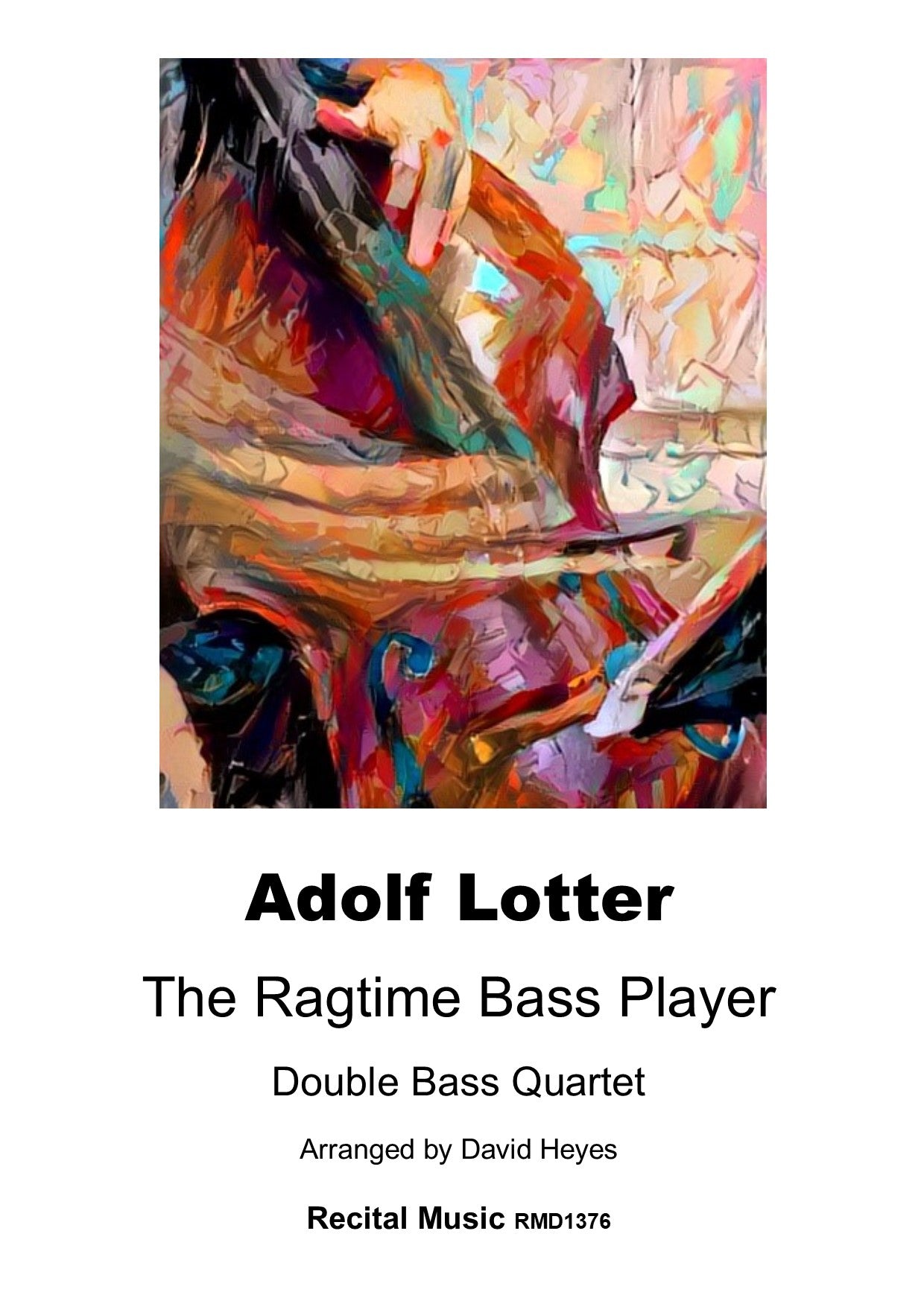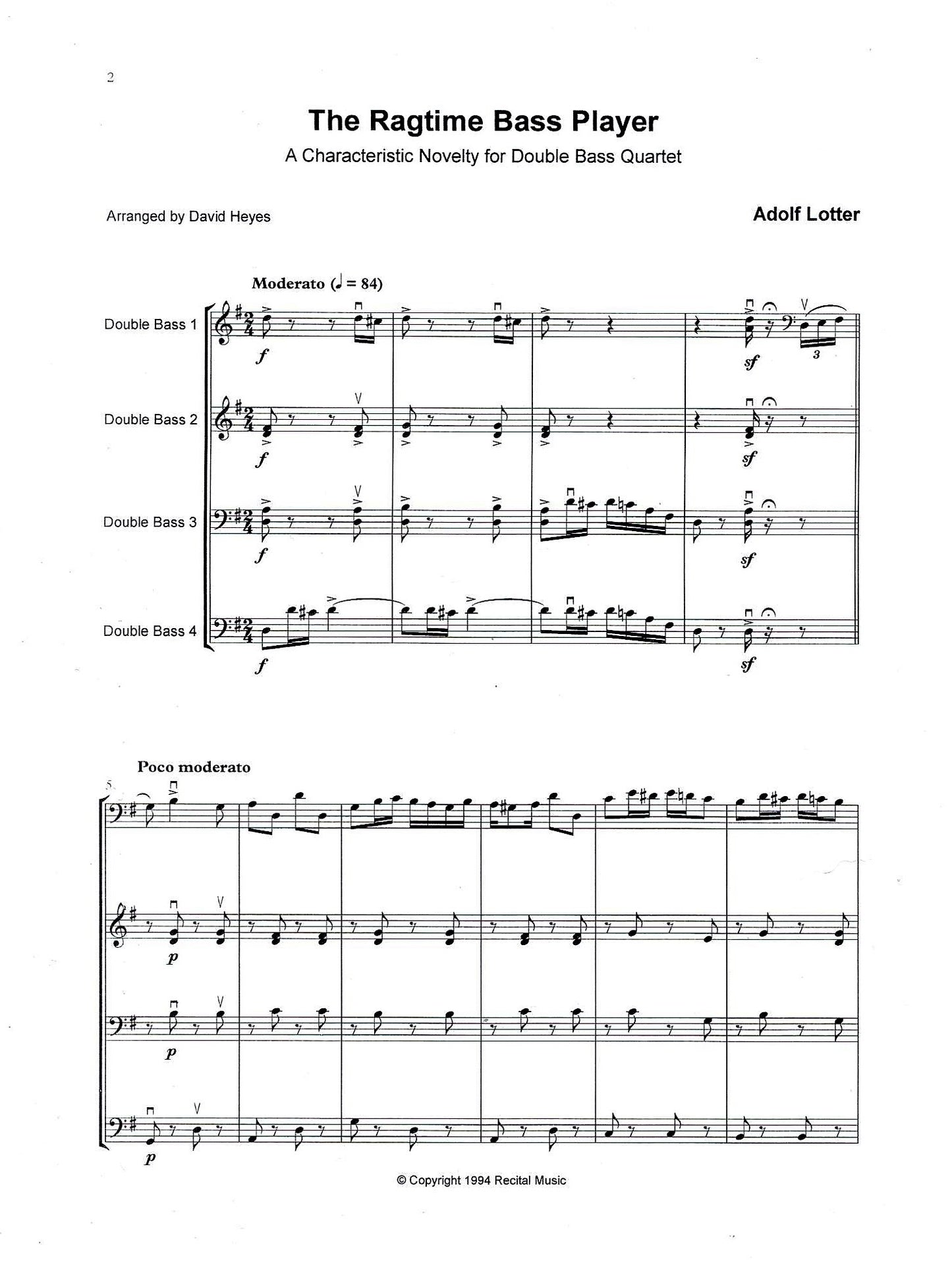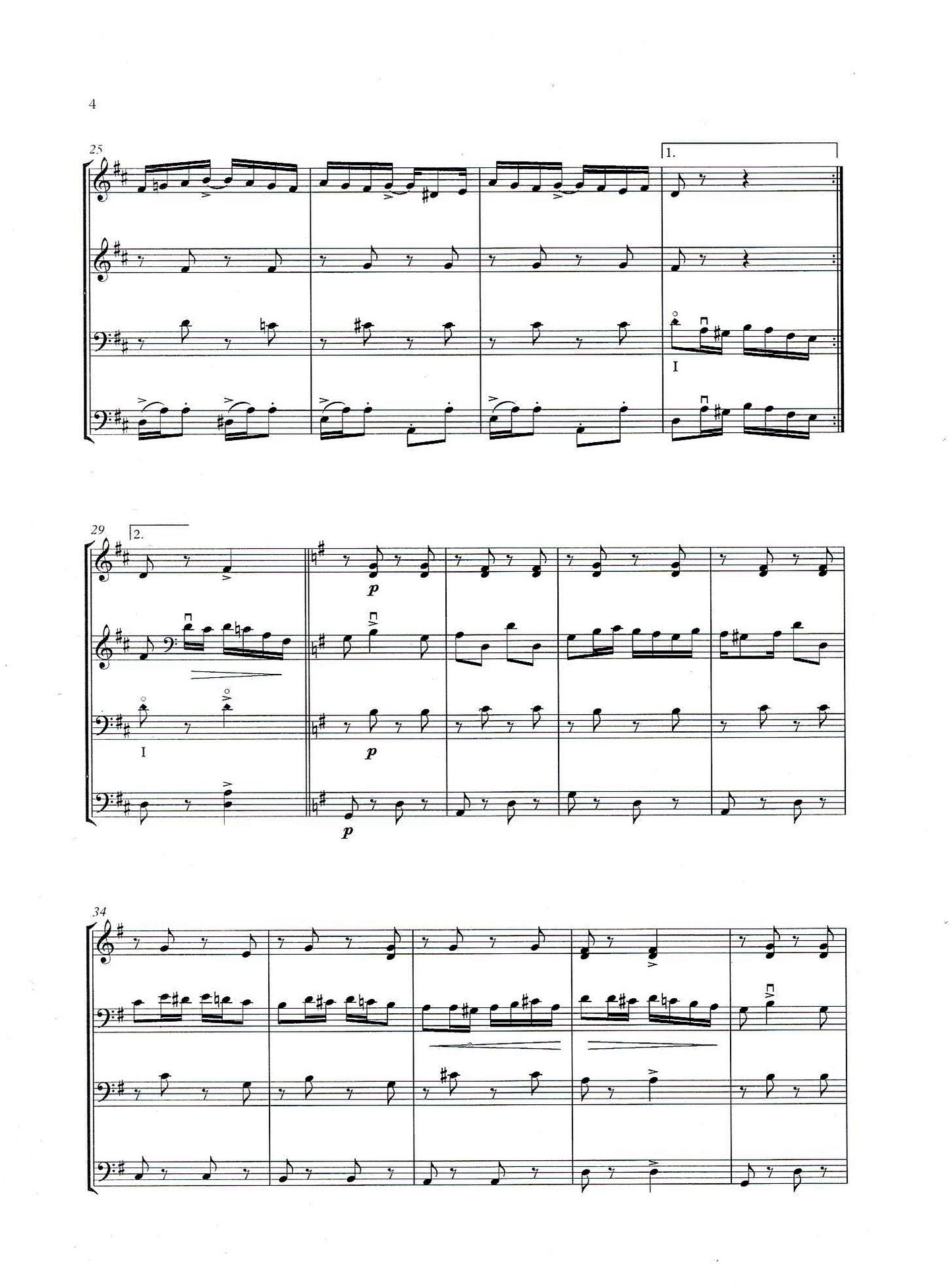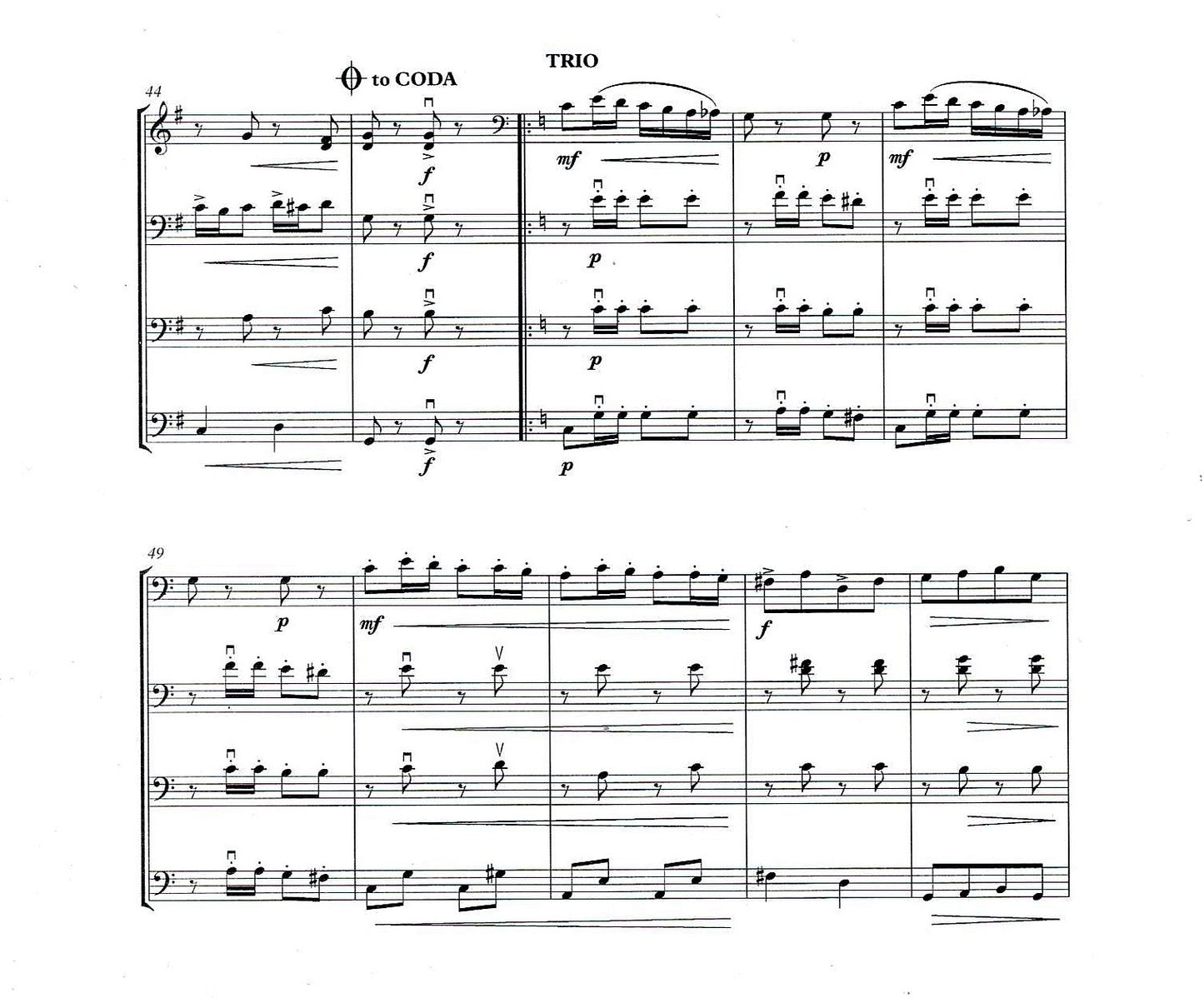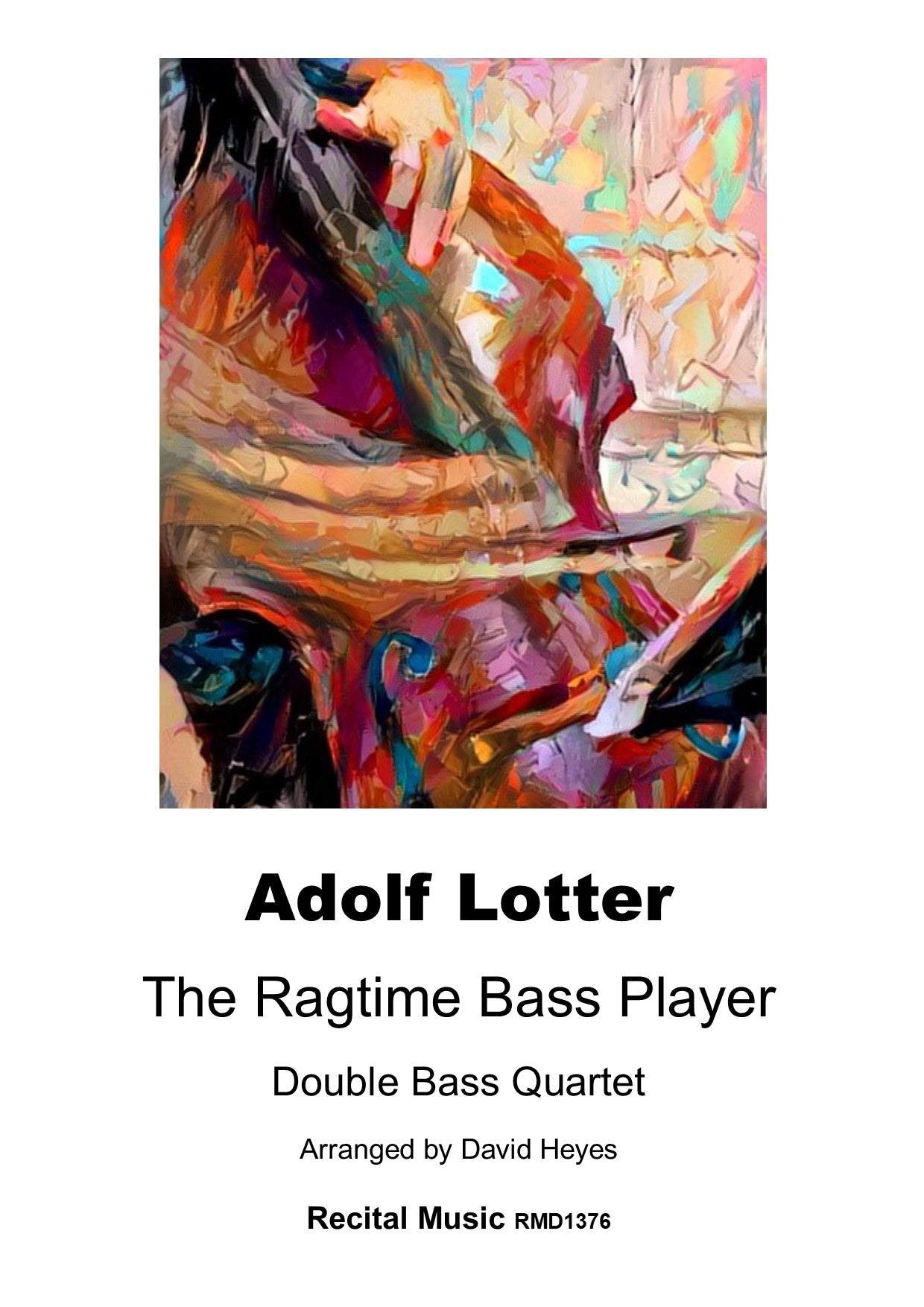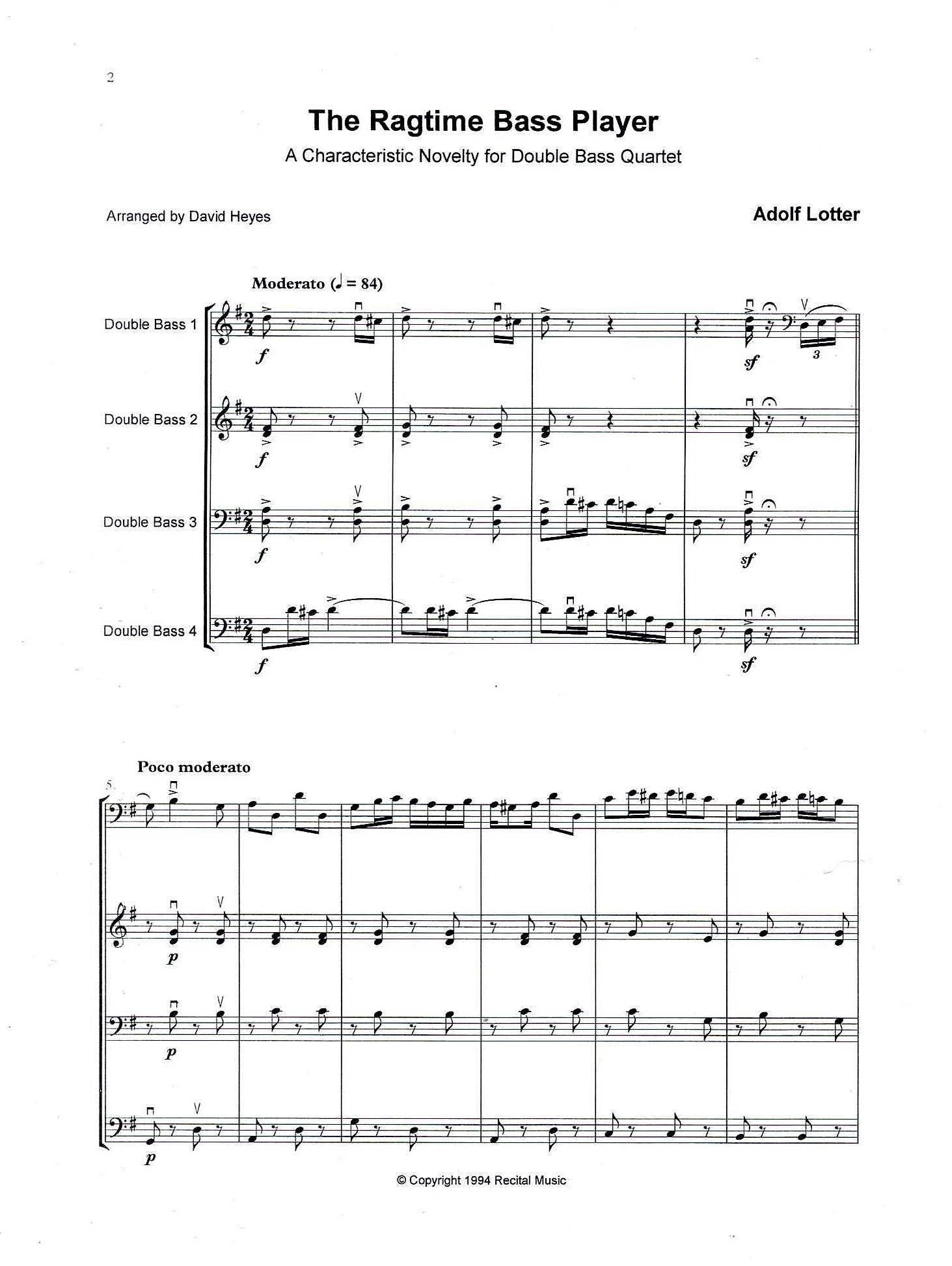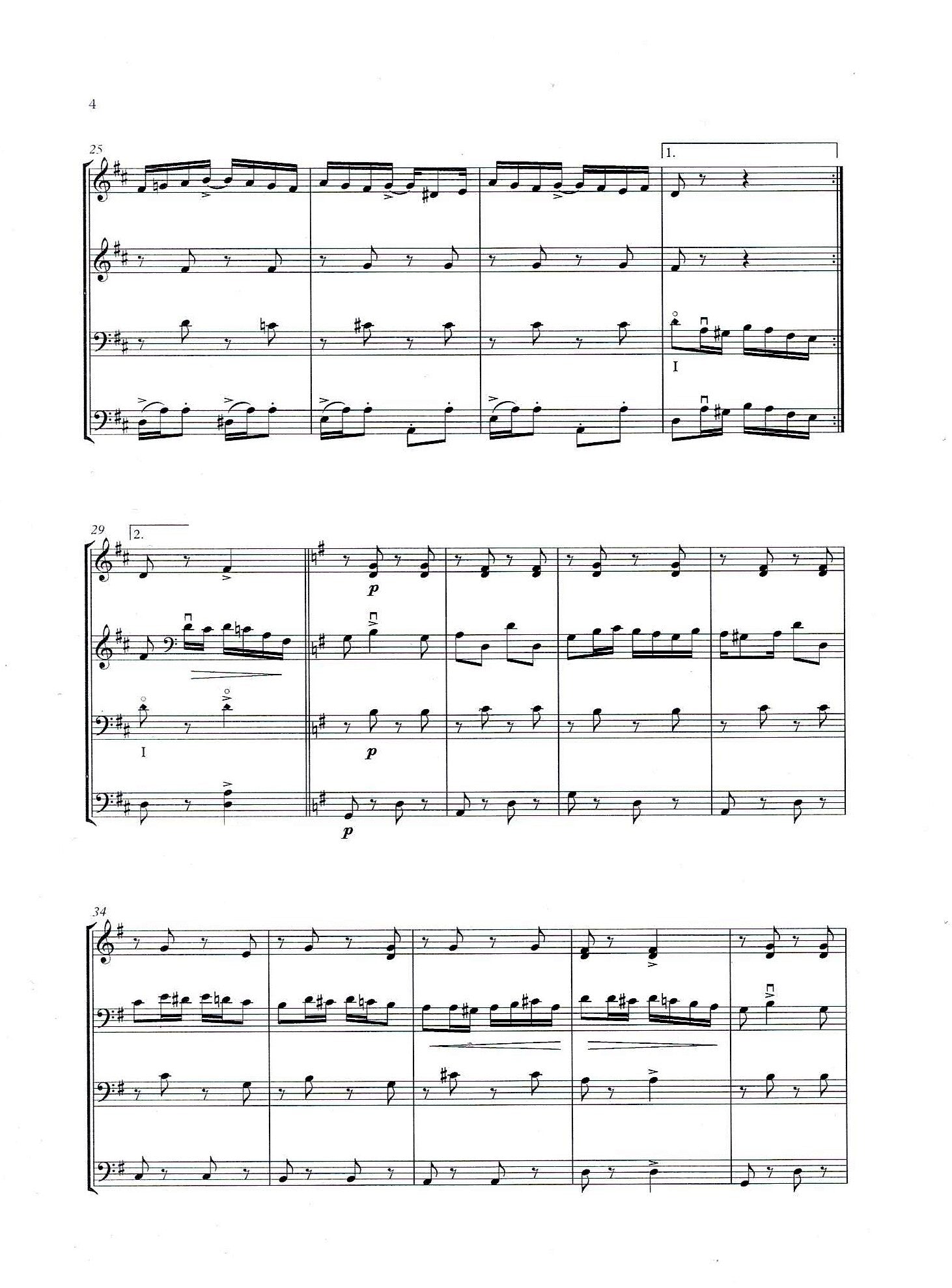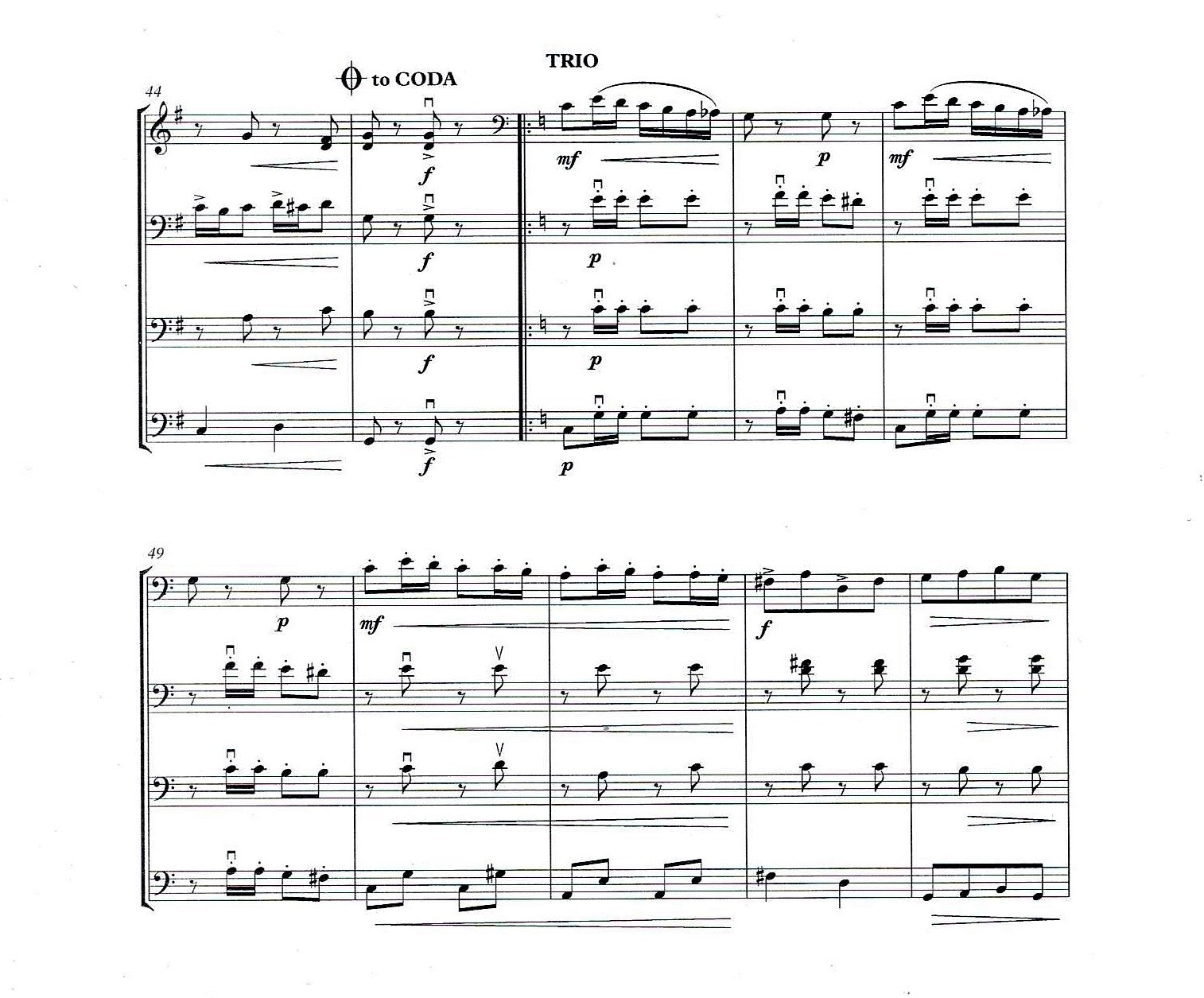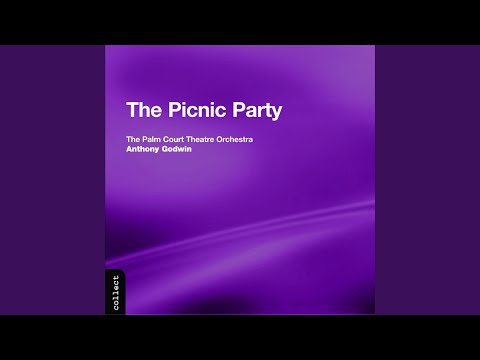David Heyes
Adolf Lotter: The Ragtime Bass Player for double bass quartet (arr. David Heyes)
Adolf Lotter: The Ragtime Bass Player for double bass quartet (arr. David Heyes)
Couldn't load pickup availability
About the Composition
The Ragtime Bass Player is Adolf Lotter's most popular work for double bass and was composed in 1913.
The music has a charm that everyone will enjoy and the four-bar introduction grabs the attention instantly. The opening double bass theme has a jaunty and playful counter-melody played by violins and piccolo which adds a great sense of fun from the outset. The solo melody remains in bass clef throughout making excellent use of the lower orchestral register of the double bass.
The music is lively, charming, and fun and would still be a great addition to any popular concert which wanted something to feature the bassists.
This edition works well with quartet or larger forces and the melodic material is shared between all four players. Bass 1 plays in treble clef but there are few technical challenges but much to enjoy. The Ragtime Bass Player is a light-hearted and fun piece which should appeal to players and audiences alike.
About the Composer
Adolf Lotter was born in Prague on 4 December 1871 and studied double bass with František Černý, and composition with Antonín Dvořák, at the Prague Conservatoire.
He lived in London from 1894, until his death in 1942, and quickly established himself as one of the leading bassists of his generation, performing with many of the famous conductors of the day including Sir Henry Wood, Richard Strauss, Weingartner, and Sir Thomas Beecham.
Lotter was a member of the Queen's Hall Orchestra for over thirty years (1898-1930), becoming Principal Bass in 1911, and also played with the London Symphony Orchestra, London String Players, Guildford Symphony Orchestra, and Glyndebourne Festival Orchestra (1935-36).
Apart from in 'Light Music' circles or amongst double bassists, the name of Adolf Lotter has long ago been consigned to the history books. Czech born, he lived most of his life in London and was one of the leading bassists of his generation alongside his multifarious activities as a composer and arranger.
Adolf Lotter was born in Prague on 4 December 1871 and studied double bass at the Prague Conservatoire with Vendelín Sládek (1851-1901), and composition with Antonin Dvorak (1841-1904). He showed much musical talent from an early age and had already composed a double bass concerto before the end of his studies.
"...Mr Lotter once showed the celebrated master, Doctor Dvorak, the MS. of a concerto for the instrument, but his sole and discouraging reply was "Man! Whoever is going to listen to a double bass solo, why don't you write a violin concerto?" However, later he performed the concerto with orchestral accompaniment and, at the conclusion Doctor Dvorak came forward and rapturously shook hands with the young performer and said "I did not know that so much could be done on the double bass." It was performed later at the Crystal Palace in London in 1895, conducted by August Manns (1825-1907), and has probably not been played since then.
In 1894 Lotter moved to England and settled in London where he lived until his death in 1942. He worked as an orchestral bassist and composer-editor for Hawkes & Son (later to become Boosey & Hawkes) and his diary, which he kept from 1894 to 1914, gives a rare and fascinating insight into the working life of an active and multi-talented musician. Written in an elegant copperplate hand and in his adopted language of English throughout, Lotter records many of his concerts, including names of the conductor and soloists, his activities as a composer and arranger, alongside his various European visits and income from his musical exploits.
The diary also gives a wonderful perspective of the 'real' person and the entries of a non-musical nature often add to the whole, helping to flesh-out the picture, bringing the name back to life and lifted from the history books. 1899 Febr. 9 - 50 frank gold piece bought from Wostatek 50/- Febr. 25. - Harmony Club Bohemian Fancy Dr. [Dress] Ball. Raided: shocking lies told by the police. Jusp [Justice of the Peace] Shannon March 2 - Fight with B. at East Street April 2. - Supper at 59 East Sq. Bldgs [Buildings]. Mr. & Mrs. Payne & Jennie Payne [Jennie was Lotter's future wife] Oct 16. - Italian Double Bass bought from Signor Auzenipamber. Paid on account £15.0.0. Dec 4. - Received silver cigarette case from Miss J. Payne.
Adolf Lotter worked with many of the leading musicians, composers and conductors including Henry Wood, Edward Elgar, Richard Strauss, Eugene Ysaÿe, Arthur Nikisch, Camille Saint-Saëns, Felix Weingartner, Fritz Kreisler, Joseph Joachim, Enrico Caruso, Thomas Beecham, Edvard Grieg, Beatrice Harrison, Nellie Melba, Pablo Casals, Ernst Dohnanyi, Jan Kubelík, Bruno Walter, Otakar Ševčík and Arnold Schoenberg, to name but a few! In a career lasting almost fifty years, his diary is a veritable Who's-Who of the leading musicians of the day.
As an orchestral bassist Lotter played throughout Great Britain and was Principal Bass of the Queen's Hall Orchestra, London Symphony Orchestra, Guildford
Symphony Orchestra, London String Players and Glyndebourne Festival Orchestra (1935-36). He was a member of the Queen's Hall Orchestra from 1898 to 1930 and his first concert was on 23 October 1898, as 6th bass, and conducted by Henry Wood. A year later he was promoted to 5th bass for his second season with the orchestra and became Principal Bass in 1911, recording in his diary: 1911 May 8 - Letter arrived from Sir Henry Wood with the offer of the principal Bass Player Q.H.O.
Alongside his performing and recording commitments, Lotter became and editor and music adviser at Hawkes & Son from 1906, having already sold several of his works to Hawkes (Rouge et Noir, 1906) and Boosey & Company (March - The Shamrock). His list of original works and arrangements is certainly impressive and he was a busy and productive musician throughout his life in London.
Apart from his early Concerto for double bass and orchestra, Lotter composed remarkably few works for his own instrument. 'Darby & Joan' is scored for double bass and violin (or bassoon and flute) and piano, or string orchestra and was originally published by Melodeon, his own publishing company. Described as a 'novelty intermezzo', the music is light and accessible, tuneful and lively, with few technical challenges for either soloist and is typical of the salon music of the early years of the 20th-century. He also transcribed a Trio for viola, cello and double bass by Ignaz Pleyel (1757-1831), although there is no indication on the manuscript, which is beautifully and clearly written, about the origins of the original trio.
Lotter's 'Practical Tutor for the Double Bass - Professor Josef Hrabe's Method', published in 1933, is still in print today! The Ragtime Bass Player is probably Adolf Lotter's most popular work for double baas and was composed in 1913, and celebrated its centenary in 2013. His diary entry reads: 17 April 1913 Hawkes decided to buy Bassplayer in Ragtime 9 May 1913 Cheque 10.10.0 for Ragtime Bass player The fee of 10 pounds and 10 shillings in 1913 was a good one, when a typical average annual income was only £51 (sterling). The title of the piece obviously changed between the two dates and was eventually published in 1913 by Hawkes & Son as 'The Ragtime Bassplayer'.
It was described as a 'characteristic novelty' and was scored for full orchestra, but featuring the double bass section as soloists. Composed at the height of the ragtime craze, with syncopations aplenty to keep the bassists busy, they are ably accompanied by the rest of the orchestra. Scored for full orchestra (Piccolo, Flute, 2 Oboes, 2 Clarinets in A, 2 Bassoons, 4 Horns in F, 2 Cornets in A, 2 Trombones, Bass Trombone, Percussion, Harp (ad lib.), Strings), the piece is lively and full of fun, very much in the salon music style, but accessible for any audience and a great opportunity to put a bass section through its paces. The music has an elephantine charm which everyone would enjoy and the four bar introduction grabs the attention instantly.
The opening double bass theme has a jaunty and playful counter-melody played by violins and piccolo which adds a great sense of fun from the outset. The basses remain in bass clef throughout and this was obviously written with a typical bass section of Lotter's day in mind. There are three main sections (ABCABD), alongside
the opening introduction and a nine-bar coda, each section of a contrasting musical nature but making excellent use of the lower orchestral register of the double bass.
The music is lively, charming and fun and would still be a great three-minute addition to any popular concert which wanted something to feature the bassists. The original publication consisted of a Piano-Conductor score, cued with the piccolo/violin part and the solo part written at pitch below the piano stave, and a set of orchestral parts. As with much salon music of the day it could be played with different instrumental combinations and as long as you have a double bass, piano and a melody instrument it will work just as well as with full orchestra. The salon music composers knew how to create works which had a flexible scoring and each ensemble would probably have tailored each piece to suit their own particular needs. It is unlikely that Lotter ever meant to be played as a double bass solo with piano, but it lends itself to this combination and provides a great teaching or recital piece for the intermediate bassist who isn't quite into thumb position yet.
Adolf Lotter's music came out of copyright on 1 January 1993 and Recital Music brought The Ragtime Bass Player back into print the following year, having been out of print for decades, producing a number of editions to make it accessible for different instrumental combinations. Is this a forgotten or overlooked musical masterpiece? I don't think so, but it is a fun and entertaining piece from the early years of the 20th-century, at a time when few works for solo double bass were composed in Britain. It is easy on the ear, full of enjoyable and accessible music, playable in a number of combinations and doesn't test the technical prowess of the double bassist or the patience of an audience. Lasting a little over three minutes, there is much here to enjoy and nothing to complain about. Lotter's aim was surely to write music which would be enjoyed by performers and audience alike and in this he succeeds brilliantly.
[David Heyes]
